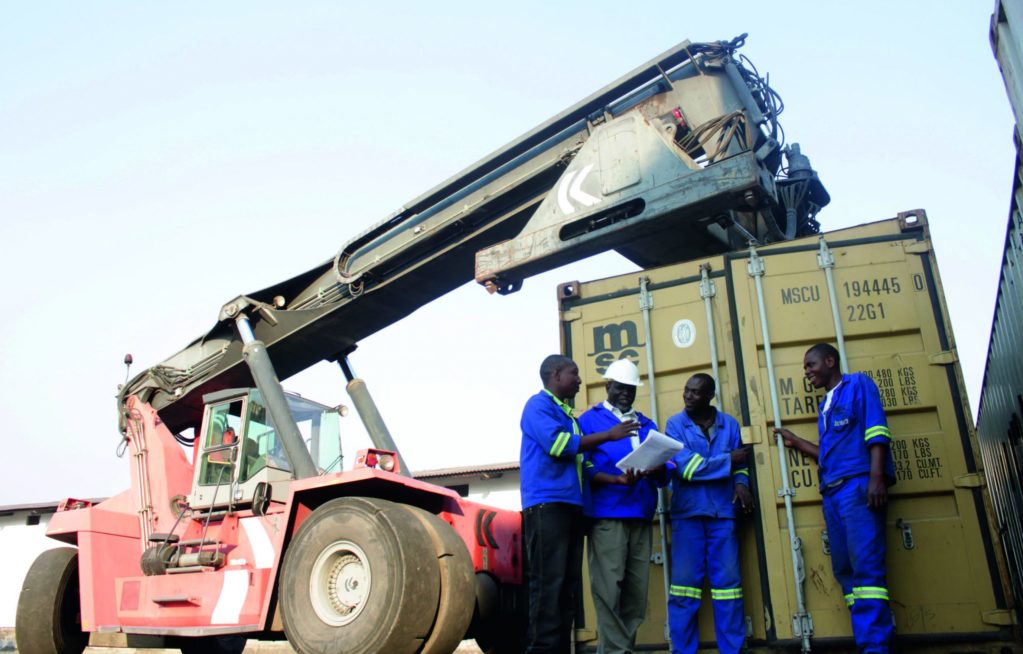The city of Mutare, set in a hollow on the Zimbabwe-Mozambique border, is sweltering under another blue sky. In this border town hemmed in by dramatic mountains, a small scene is being played out in the historic stage play that is Zimbabwe’s indigenization policy.
The lead actor is 52-year-old Charles Tawazadza—a man who has gone from manager to boss at this busy dry dock almost overnight, thanks to the country’s attempt to give black Zimbabweans a larger slice of the economy.

Mutare Dry Port, Charles Tawazadza
“When you talk about this wealth, you are talking about the wellbeing of generations. We did not borrow this land or economy from our ancestors. We borrowed it for the future generations to come. If we don’t acquire it and make good use of it, future generations will be spitting on our graves instead of praising us,” he says.
The company, through which Tawazadza now strolls confidently in his corporate uniform, is one of thousands of foreign-owned outfits across Zimbabwe that appear destined to be taken over by people born and bred in the country. They range from mines to banks and safari companies. The Empowerment Ministry has threatened to revoke or suspend operating licences for more than 500 foreign owned companies, which haven’t yet fallen in line. That is a lot of valuable equity up for grabs and the word is the well connected are hovering.
Tawazadza has taken over Mutare Dry Port, a shipping cargo company with a $3 million asset value. It used to be called GMS Cornelder and had been owned by Mozambican investors since 2000. When pressure came to hand over 51% of the equity, the Mozambicans put forward Tawazadza, who had worked in management at the company for many years, to take control and settled for being minority shareholders.
Even Tawazadza’s name fitted—in Shona it means “to fill up”. Mutare Dry Port has rail sidings with a holding capacity of 24 wagons, a general and bonded warehouse, plus container handling equipment. It has global networks through partnerships operating under specialized air and ocean freights, road and rail transportation, and warehousing and container handling. It means everything from second-hand cars from Japan, to fruit from South America, arrives at Mutare Dry Port to fill up the rolling stock. Many of the goods arrive at docks in Beira in Mozambique and are shipped by rail to Mutare.
Rail runs into Tawazadza’s huge transit shed and container yard, which handles 180,000 tons of shipments every month. There’s even a runway—a legacy of the British Royal Air Force, which used the site as a base during World War II. Tawazadza compares the indigenization laws to the 2000 seizure of farms by liberation war veterans. He says they too are part of an “economic emancipation” program to empower black people.
Against the allegations that these deals are merely for political cronies, Tawazadza says: “I have never met Mugabe. The laws are not anything to enrich Mugabe. He was our leader during the liberation struggle, and he is our leader today in this struggle for economic emancipation. “If you look at the noise which is coming out of the indigenization and economic empowerment, it will come to pass,” Tawazadza says.
The whites in Zimbabwe, Tawazadza says, are “calledRhodesians because Cecil John Rhodes was here to create wealth for them. And this is what President Mugabe is doing for us.” President Mugabe’s jumbled commercial farm seizures have reduced agricultural production, leaving unexploited farms, after driving out over 4,000 former white farmers in the name of an agrarian revolution. Independent economist John Robertson claims farm production is 60% down compared to 1998, although government figures refute this. “Over 4,000 white farmers have been replaced by over 400,000 black owners. All these blacks represent Mugabe’s vision,” Tawazadza said. “People are negotiating and cutting deals without government intervention. I acquired this company on my own.
No one from government came to negotiate on my behalf,” Tawazadza said. But the laws could prove a Pyrrhic victory for a country desperate to emerge from a long recession. Capital could dry up, and the capacity of Zimbabweans to borrow and increase production may be limited. Investors say the laws could scare foreign companies with concerns about property rights, leaving Zimbabwe as a hard sell.
Ray William Black, of Investec Securities, said at a recent investor conference in Harare: “The economy of Zimbabwe has been improving over the last years, but to attract investment, foreign investors have a choice to make. If one country has more onerous conditions than another, then investment will stay away.

Mutare Dry Port, Charles Tawazadza
“No country should make it too difficult for investors if they want to attract money. In Zimbabwe, companies that have been operating are caught between a rock and a hard place. They are already under immense pressures, and facing major changes.”
Back in Mutare, Tawazadza has plans to expand and turn his company into a $10 million asset. For a man in the cargo business, with a name that means filling up, there is no turning back or thought of unloading his new business.
